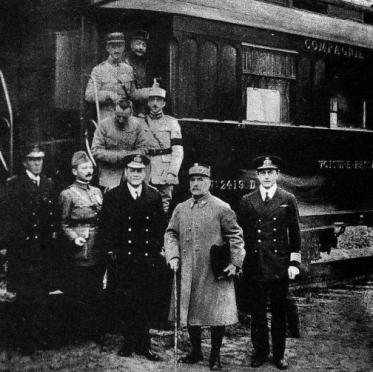November 11 in History
 hotograph taken after reaching agreement for the armistice that ended World War I in Ferdinand Foch's own railway carriage in the Forest of Compiègne - Wikipedia
hotograph taken after reaching agreement for the armistice that ended World War I in Ferdinand Foch's own railway carriage in the Forest of Compiègne - Wikipedia
1918 – Germany signs an armistice agreement with the Allies in a railroad car in the forest of Compiègne, formally ending World War 1.
The Armistice of 11 November 1918 signed at Le Francport near Compiègne ended fighting on land, sea and air in World War I between the Allies and their last remaining opponent, Germany. Previous armistices had been agreed with Bulgaria, the Ottoman Empire and the Austro-Hungarian Empire. Signed at 5:45 a.m. by the Allied Supreme Commander, French Marshal Ferdinand Foch, it came into force at 11:00 a.m. Paris time on November 11 and marked a victory for the Allies and a defeat for Germany, although not formally a surrender. The actual terms, largely written by Foch, included the cessation of hostilities, the withdrawal of German forces to behind the Rhine, Allied occupation of the Rhineland and bridgeheads further east, the preservation of infrastructure, the surrender of aircraft, warships, and military materiel, the release of Allied prisoners of war and interned civilians, eventual reparations, no release of German prisoners and no relaxation of the naval blockade of Germany. Although the armistice ended the fighting on the Western Front, it had to be prolonged three times until the Treaty of Versailles, which was signed on June 28, 1919, took effect on January 10, 1920. Fighting continued up to 11 o’clock, with 2,738 men dying on the last day of the war.
-Wikipedia

